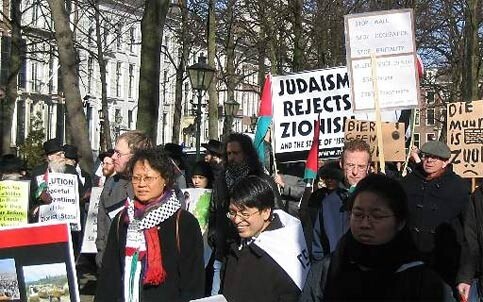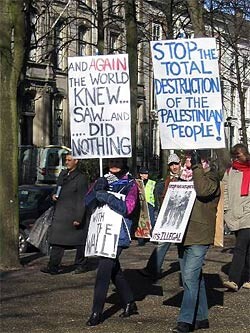The Hague, the Netherlands 9 July 2004

Demonstrations outside the ICJ, 23 February 2004. (Wilco van Esch/Socia Media)
Victor Kattan, a correspondent for Arab Media Watch and occasional contributor to EI, was at the International Court of Justice in the Hague during February 2004 to report on the West Bank Barrier hearing. On the day the ICJ gives its advisory opinion on the legality of the Barrier, EI reprints Victor’s diary from the initial hearings.
Day 1: Monday 23 February
It was a cold Dutch morning and it was snowing. On my train journey to The Hague I imagined pitched battles taking place between Israeli and Palestinian demonstrators throwing snow balls instead of stones at one another. But alas by the time I reached The Hague the snow had melted.
Instead of taking the tram from the train station at Den Haag Centraal I opted to walk to the Peace Palace, the location of the ICJ. Security was tight as one would have imagined. I had to make my way to the Palace through the rows of Dutch police that had gathered outside the main gate. On my way I passed by Jewish activists making preparations for their demonstration against the court.
As I stood in line for my security check I suddenly realised that I was standing next to the Special Rapporteur for Human Rights in the occupied Palestinian territories. We got talking about a few things and then a retired Professor of Public International Law from the Free University of Amsterdam joined in the conversation.
After passing through security I had to get my photo taken which was superimposed on a plastic card that I had to wear around my neck wherever I went. It was very fancy. I was then directed to a small room inside the Peace Palace where two large monitors were displaying the proceedings live from the chamber down the hall. I found a seat next to a lady from Amnesty International.
As the 15 judges walked into the great hall I suddenly realised how small it was. There was probably room for no more than 100 people. The Judges sat down on a long table that stretched out across the length of the hall. After some preliminary matters were dealt with by the President of the Court, the Ambassador and Permanent Observer of Palestine to the UN, Nasser Al-Kidwa, took stage.
“I stand before you as a Palestinian… the indigenous people of the land… dehumanized, demonized, dispossessed, and dispersed,” boomed Al-Kidwa.
He continued: “If the wall is allowed to continue it will render the two state solution as an end to the conflict practically impossible.”
He noted that “suicide bombings harm the just and honourable cause of the Palestinian people,” but stressed that “if Israel wanted to prevent suicide bombers it could have constructed the wall on its own territory and built it as high as 80 metres instead of 8 metres if it liked.”
He said the first suicide bombing occurred 27 years after the beginning of the Israeli occupation.
“They [suicide bombings] are the result of the occupation and not the cause of the occupation.”
Next to speak was Stephanie Khoury, an advisor to the PLO and a member of the negotiation support unit. Khoury explained on a slide show how the wall affects the lives of thousands of ordinary Palestinians denying them access to health care, water resources and holy sites. Pictures of the wanton destruction of homes and market places, the uprooting of olives trees, and the displacement of persons from the areas annexed for the construction of the wall clearly demonstrated that the measures resorted to by Israel in response to the suicide bombings were disproportionate.
Then it was the turn of the lawyers, and the Palestinians had managed to assemble an all-star cast.
First in line was James Crawford, Whelwell Professor of International Law at the University of Cambridge. Crawford tackled the issue of the jurisdiction and admissibility of the Court. On the issue of Israel’s lack of consent to the judicial process taking place before the international court, Crawford noted:
“Israel cannot object to the General Assembly discussing the case of Palestine. Indeed the General Assembly discussed Palestine even before the existence of Israel.”
On Israel’s argument regarding the insufficiency of the evidence presented to the Court, Crawford retorted:
“Israel cannot plead lack of facts when any lack of facts could have been cleared by Israel … The dominant fact is the $2 billion fact.”
The $2 billion fact according to Vaughan Lowe, Chichele Professor of International Law, University of Oxford, was the $2,000 million price tag which it is costing Israel to construct the wall inside the occupied Palestinian territory of the West Bank. He stated that Israel as the occupying power has responsibility to take care of the human rights of the Palestinian people.
“Punishing the whole Palestinian population is unfair, unprincipled and unreasoned.”
Georges Abi-Saab, Professor of International Law, Graduate Institute of International Studies, Geneva, opined that Israel as the occupying power was under an obligation to restore law and order in the occupied territories and termed what is happening in the territories as “prolonged occupation bordering on annexation”.
Speaking in French, Jean Salmon, Professor Emeritus of International Law, Universite Libre du Bruxelles, was adamant that:
“You don’t have to be a rocket scientist to understand that Israel wants to prevent the court from passing judgment so that Israel is not subject to international law whatsoever.”
All in all it was a good day for the Palestinians. As I left the ICJ I got stuck in a crowd of Israeli protestors waving the Star of David and complaining vociferously about Arab “terror”. I kept quiet. The Dutch authorities have allocated time and space for Israel’s supporters to demonstrate in the mornings and for the Palestinians to demonstrate in the afternoons.
Day 2: Tuesday 24 February
In a rain-soaked day at The Hague, up to 100 Israeli demonstrators crowded outside the court in a second day of protest at the proceedings taking place on the legal consequences of a separation barrier being built by Israel inside the occupied Palestinian territory of the West Bank. “Fence Out the Terror, Give Peace a Chance” was the slogan used by the Jewish Agency for Israel and the World Zionist Organisation. The French Likoud group held up a banner stating “The Only Palestinian Culture: Terrorism. End the Palestinian Myth”.
According to reports in the Dutch media, The Hague mayor Wim Deetman has clashed with the Israeli embassy over 926 photographs supplied by the embassy to pro-Israel demonstrators protesting against the hearings taking place at the ICJ.
The Dutch organisation Christians for Israel has refused to say who supplied the pictures to the embassy, which show the faces of Israeli victims of Palestinian attacks as a result of Israel’s ongoing military occupation of East Jerusalem, the West Bank and Gaza Strip. The Israeli embassy in The Hague has not denied reports that it supplied the photographs, but issued a statement saying it did not think there was anything wrong in doing so.

Demonstrators with placards outside the ICJ, 23 February 2004. (Wilco van Esch/Socia Media)
The Dutch police have imposed a policy of keeping apart pro-Israel and pro-Palestinian demonstrators. Today it was only the pro-Israel groups that were demonstrating in front of the court chanting songs in the rain. The hearings are due to come to a close tomorrow, and it may take the court several months to come to its decision.
Day 3: Wednesday 25 February
It was the turn of the Arab League and the Organization of the Islamic Conference to issue oral pleadings to the court this morning. No demonstrations took place outside, and in the midst of intermittent flurries of snow I was serenaded by the Royal Band playing the Dutch national anthem outside Queen Beatrix’s Palace Nooreinde as she received the new Austrian ambassador.
Over the last three days, the demonstrations and the oral pleadings submitted by and on behalf of the Palestinians have been revealing. Israel did not submit oral pleadings, but did submit a written statement to the court.
In the statement, Israel constantly referred to the problem of “terrorism” and argued that the barrier it was constructing is necessary for its security. This was reflected in the pro-Israel demonstrations taking place outside the court. The demonstrators had one message: “Eliminate the Arab Terror”.
If it was all about security, according to the Palestinians Israel should build the wall in its own territory. In constructing the wall in the West Bank, they argue that Israel is effectively annexing territory, prohibited by the UN Charter and international law.
The pro-Israel demonstrators complained that the court was not competent to issue an advisory opinion as this was solely a matter for negotiation between Israel and the Palestinians. “Israel has the right to defend itself… We are here, they are in there,” was the cry of a pro-Israel speaker with a heavy American accent at the demonstration.
One banner displayed by the demonstrators insinuated that the oral pleadings taking place at the ICJ were a reflection of European anti-Semitism and Arab terrorism. This was despite the fact that the European Union has effectively boycotted the proceedings even though public opinion in Europe is against the wall.
Yesterday, Jordan argued that the wall could lead to another exodus of Palestinians from the West Bank to Jordan. Israeli newspapers were quick to pick up on this point, even though this statement only formed a small part of its oral pleading.
Prime Minister Ariel Sharon was quoted yesterday in the Israeli daily Yedioth Ahronoth describing the hearings at the ICJ as an “international circus”, vowing to complete the wall.
According to a report in the Dutch newspaper NRC Handelsblad, the mayor of The Hague, Wim Deetman, has refused an invitation by his Israeli counterpart to see the carnage wrought by the latest suicide attack in Jerusalem.
Today was the last day of the pleadings. It is expected that it will take the court several months to deliver its opinion.
Related Links





